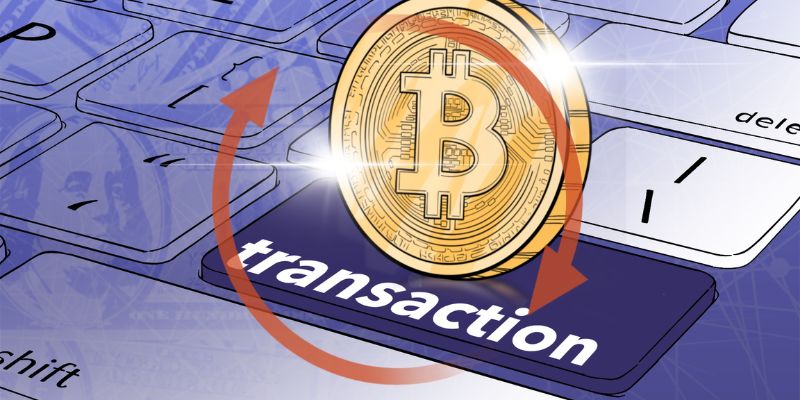How to make secure crypto transactions might seem daunting in a world where headlines shout about hacks and scams. But fear not! I’m here, your crypto guardian, to guide you through the digital wilderness. Imagine moving your digital coins around with the confidence of a pro. It all starts with mastering a few basics. Get ready to dive into the no-nonsense know-how of locking down your crypto wealth.
Understanding the Cornerstones of Secure Crypto Transactions
Embracing Best Practices
When you trade crypto, think of your digital wallet like a bank vault. Keep it locked up tight, so no one can sneak in. Always protect your private key; it’s like the vault’s secret code. If someone gets it, they can take your coins. Use two-factor authentication (2FA) for an extra lock on your crypto. Hardware wallets give your coins armor, shielding them from hackers. Pick a secure exchange to trade on as if you were choosing a safe house. Watch every transaction like a hawk to catch any sneaky moves.
Avoid public Wi-Fi when trading crypto; it’s like leaving your vault door open. Make sure your software wallet has strong security, too—it’s not as armored as hardware, but still important. Don’t fall for fast talk; double-check every crypto move you make. Smart contracts can be traps; look closely before you agree. Make SSL encryption your best buddy; it’s an invisible shield for your coins online. Get a good anti-virus to guard your computer; think of it as a cyber watchdog. And last up, keep all your crypto gear updated. Hackers love using old tricks on old software.
Implementing Blockchain Security Measures
Blockchain is the fortress where your crypto lives. To keep it safe, encrypt your assets. It’s like putting them in a hidden room. Always use a secure network for trading. It keeps the spies out of your business. If you see something too good to be true, like a Ponzi scheme, run the other way. Always check who sends you what; verify before you trust.
Use multisignature wallets for a team defense; more keys, more security. Cold storage keeps your crypto in a deep freeze, far from hackers. Teach yourself to spot scams, don’t get fooled by shiny offers. Many tricks look legit, so always be a detective with your crypto. And here’s something easy but useful—check the URL! Make sure you’re on the right site, not a copycat.
Keep your keys to yourself—both public and private ones. You have to follow the rules, so get to know crypto laws. And if anything goes wrong, you want backups ready to save the day. If you can, limit how much crypto you can take out at once. It stops big losses if something bad happens.
Coming up with a secure passphrase is like writing a secret poem. It keeps others from guessing it. When you send or receive crypto, be sure you’re using the right wallet address. It’s like triple-checking the address on an envelope before mailing a precious letter. And if you’re serious about your crypto, think about having a separate phone or computer just for that. It’s like having a private room for your secret crypto world.
Trade smart, stay alert, and always be two steps ahead. That way, you’ll keep your crypto safe from the online wilds.
The Anatomy of a Protected Wallet
Hardware Wallets vs. Software Wallets
When it comes to securing your crypto, the wallet you choose is key. Hardware wallets, like Trezor or Ledger, are physical devices that keep your crypto offline. They’re seen as top-notch because they are less open to hacks. Think of them as safes for your digital coins.
Software wallets, though, live on your devices – phones or computers. They are handy, but they have more security risks, since they stay online. Yes, they are guarded by tech like SSL encryption. Still, they can fall prey to malware or hacker tricks.
What’s crucial here? Know the trade-offs: hardware wallets offer stronger protection but might be less convenient; software wallets are easy to use but require more vigilance.
The Fundamentals of Private Key Protection and Cold Storage
Let’s unpack private keys first. They are like the secret codes that lock up your crypto. Protect them, and you’re golden. Lose or share them, and you might as well say goodbye to your coins. How to shield them? Never store your private keys online where they can be stolen. Write them down, lock them up, and ensure they never touch the web unless you’re using them in a transaction. Cold storage takes this up a notch. It’s all about keeping your private keys completely offline—no internet, no risks.
To set up cold storage, you might use a paper wallet (your keys printed on paper) or a hardware wallet. Either way, your details are away from the online world and safe from digital thieves.
Here’s one big tip: keep backups. If your hardware wallet is lost or your paper wallet is damaged, a backup helps you get your crypto back. Just make sure your backup is kept in another secure spot.
Protecting your crypto means understanding the ins and outs of wallets. Choose a wallet that fits your needs – hardware for high security, software for ease of use. Guard your private keys like treasure. Consider cold storage for the ultimate shield. Keeping these in mind will help you carry out secure cryptocurrency transactions. Remember, in the crypto world, you’re your own bank, and these best practices are your security guards.
Navigating the Ecosystem: Choosing Platforms and Enabling Security Features
Selecting Secure Crypto Exchanges and Reputable Platforms
When picking a place to buy and hold your digital cash, think safety first. You want a secure crypto exchange. One that keeps your coins safe, just like a bank. Check out their history. Have they been hacked before? How did they fix it? Also, make sure they follow the law and care about keeping your stuff safe.
A good sign of a secure platform is when they keep most of their digital money offline, in what we call cold storage. This makes it tough for bad guys to get to it. Look for exchanges that also let you use multi-signature wallets. These need more than one key to open. Just like needing two keys to open a vault.
Lastly, always read what other folks say about the platform. Stick to places with happy users and few complaints about lost coins. Big names in the game usually care more about security because they have a reputation to keep up.
Additional Security Layers: Multi-Factor Authentication and Multi-Signature Wallets
To protect your digital wallet, turn on every security feature possible. The best start is two-factor authentication (2FA). This means when you sign in, you need two proofs to show it’s really you, like a password and a code sent to your phone. This extra step helps keep thieves out.
Then there’s multi-signature wallets, which need more than one approval to make a deal go through. This is like having a double lock on your door. Even if someone gets one key, they still can’t get in. It’s handy for groups too. Say you’re part of a team handling the same pot of money. Multi-signature wallets need okay from everybody before money moves. This keeps everyone honest.
Using these extra layers of security makes it so much harder for someone to sneak into your wallet. Remember, a little hassle setting these up now can save you a major headache later on. Your future self will thank you for being smart about securing your cryptocurrency today. Always keeping your wits about you in the crypto world isn’t just smart; it’s a must.
Proactive Defense Against Common Threats
Recognizing and Avoiding Phishing, Scams, and Ponzi Schemes
Staying safe in the crypto world is a big deal. We all want our digital coins safe, right? But sneaky scams and phishing attacks can catch you if you’re not sharp. Let’s be real smart and beat them at their game. To start, always check that URL before you click. If it looks fishy, it probably is. Trust me, it’s a simple but lifesaving move.
Next, watch out for promises that sound too good. If someone says you’ll get big bucks fast, step back. They may be luring you into a Ponzi scheme. Let’s stick to what we know and trust. And that’s not some random, super-profit promise. Remember, if it smells like a fish market, there’s something fishy going on!
Ensuring Safe Trading Practices and Keeping Current with Updates
Trading crypto can be tricky, but we’ve got this! First, make your password strong. Mix in numbers, symbols, and both big and small letters. And don’t use the same one for everything. That’s asking for trouble.
Got a digital wallet? Keep that key private safe. It’s the only way into your treasure and you don’t want anyone else finding it! Hardware wallets are gold for storing private keys. They’re like a super-safe that only you can open. Plus, they’re not online, so hackers can’t touch them.
Never forget two-factor authentication – it’s like a secret handshake for your accounts. It’s super easy to set up and stops the bad guys from getting in. Always go for a hardware wallet when you can. They keep your crypto under lock and key, offline and out of reach.
When you’re about to trade, double-check that wallet address. If you send to the wrong one, say bye to your crypto. That’s not what we want! And keep your eyes peeled for updates. Staying current keeps you one step ahead of threats.
So, there we have it, folks. Keep these tips in mind:
- Check URLs every time.
- Walk away from deals that seem crazy good.
- Keep updates on the regular.
With a keen eye and smart habits, your crypto transactions will be as secure as a bank vault!
To sum it up, we’ve walked through the must-dos of crypto safety. We started by hitting on the big points of tight transaction security like following top practices and locking down blockchain tech. Then, we dove into what keeps a wallet safe, looking at both hardware and software options and why keeping your private key under wraps is key.
We also talked shop about picking the best platforms and kicking up your security with steps like multi-factor checks and multi-sign wallets. And let’s not forget, we covered how to spot the bad guys like scammers and stay smart in your trading moves.
Remember, the crypto world is always on the move, so keep your guard up and your info fresh. Stay safe out there!
Q&A :
What are the best practices for ensuring security during crypto transactions?
To safeguard your crypto transactions, it’s essential to follow these best practices:
- Use reputable exchanges and wallets with strong security measures.
- Enable two-factor authentication (2FA) for an additional layer of security.
- Keep the majority of your assets in a cold wallet for greater protection against online threats.
- Regularly update your software to protect against vulnerabilities.
- Be wary of phishing attempts; double-check URLs and never disclose your private keys.
By adhering to these steps, you can significantly enhance the security of your crypto transactions.
How can I recognize and avoid scams in cryptocurrency transactions?
Scams in cryptocurrency can take many forms, so vigilance is key. Be on the lookout for:
- Offers that seem too good to be true, such as guaranteed returns.
- Unsolicited messages or emails that request your private information.
- Fake websites that mimic legitimate crypto services – always check the URL.
- Social media impersonation scams that promise high returns for a small investment.
- Any request for your private keys – remember, legitimate services will never ask for them.
Educating yourself about common scams can help you avoid falling victim to fraudulent schemes.
What measures should I take to protect my crypto wallet from unauthorized access?
Protecting your crypto wallet from unauthorized access involves:
- Choosing wallets that offer robust security features.
- Setting a strong, unique password and changing it regularly.
- Using hardware wallets for storing large amounts of cryptocurrencies.
- Regularly backing up your wallet, including your seed phrase, securely offline.
- Remaining mindful of where and how you access your wallet, especially on public Wi-Fi.
Taking these precautions can help ensure that your crypto wallet remains secure.
Is it safe to conduct crypto transactions on a mobile device?
Conducting crypto transactions on a mobile device can be secure if you:
- Use mobile wallets from reputable companies that prioritize security.
- Keep your mobile operating system and wallet app updated to the latest version.
- Avoid using public Wi-Fi networks when performing transactions.
- Utilize additional security features such as fingerprint recognition or a PIN.
Always be cautious and ensure your mobile device has adequate security measures in place before using it for crypto transactions.
Are hardware wallets necessary for secure crypto transactions?
While not strictly necessary, hardware wallets are highly recommended for secure crypto transactions, especially if you’re handling significant amounts of cryptocurrency. They offer:
- Offline storage, eliminating the risk of hacking.
- The requirement of physical confirmation for transactions, enhancing security.
- Recovery options in case the device is lost, stolen, or damaged.
For those serious about crypto security, a hardware wallet can be a worthwhile investment to protect your digital assets.



